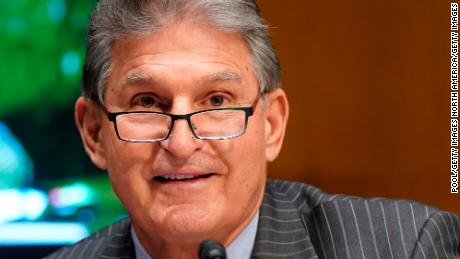Miscalculating Sinema and Manchin could end up costing Biden – CNN
“DANGEROUS CREATURE,” the Arizona Democrat’s sweater blared in all-capital letters.
The sartorial choice might have been laughed off if it weren’t for Sinema’s emerging power, along with fellow centrist Democrats such as Sen. Joe Manchin, to endanger President Joe Biden’s agenda in an evenly divided Senate.
Already, Sinema has said she opposes Biden’s proposal to insert a minimum wage increase into a massive Covid-19 relief package that he hopes to pass by mid-March. And as Neera Tanden’s nomination to lead Biden’s budget office was teetering on collapse, Sinema refused to say how she would vote, prolonging the interregnum for the controversial nominee.
Tanden’s nomination was already on life support after Manchin said he would not support her, citing old tweets she wrote that disparaged members of both parties. And like Sinema, the West Virginia Democrat also says he opposes the increase in the minimum wage.
The outsized role the centrists will play in Biden’s efforts in Congress have earned them both the attention — and, in some instances, the private ire — of White House officials, who are loathe to appear beholden to a small group of lawmakers but have almost no room for error on close votes.
As the White House maintained its public support for Tanden on Wednesday, one official suggested the increasingly quixotic effort to secure her confirmation was meant, in part, to counter the perception that Manchin had sole ability to derail Biden’s agenda.
The rules of the Senate have always allowed any individual senator to slow down a nomination, but the dynamics of a 50-50 split in the chamber have given Sinema and Manchin even more power in determining the fate of a nomination or a piece of legislation.
“That’s usually the case that one senator can stop things. It’s more dramatic now because we in the Democratic majority need to do things. We need to give the President his team,” said Sen. Dick Durbin, the Democratic whip, said on Wednesday as Tanden’s nomination hovered in limbo. “We’re doing kind of a full scale effort including the White House and members to find support.”
Since taking office, Biden has held a series of phone conversations with Manchin, according to aides, and the White House is in regular communication with Sinema’s office to assess where she stands on various areas of intense administration interest.
Asked about the influence two moderate Democrats could wield over Biden’s personnel and policy agenda, White House press secretary Jen Psaki said Biden “has the benefit of experience of recognizing the power of any one individual senator or one individual member, and he certainly respects that.”
Different styles
Sinema has long been a stark defender of her views, but she’s made a habit of expressing them privately to Democratic leadership and not in the Capital hallways with reporters or in national television interviews. Sinema, who was elected to Congress in 2018, doesn’t typically advertise how she’ll vote on a nominee or bill until she goes to the floor and does it.
The Arizona senator has been one of the fiercest enforcers of US Centers for Disease Control and Prevention guidance on distancing indoors during the coronavirus pandemic, riding in elevators without any other people and sternly reminding reporters to keep their distance from her and each other. For months, she wore neon wigs instead of going to hair salons to retouch her blonde color.
In both her political style and biography, she is a different type of senator than Manchin, who Biden worked with during his years as President Barack Obama’s vice president. Manchin has publicly embraced his role as a potential spoiler for his own party, broadcasting his disputes and relishing his kingmaker reputation while drawing irritation from the President’s allies.
Some White House officials said they felt they had a better handle on Manchin than on Sinema, who had not served during a Democratic administration until now. One close adviser told CNN that Manchin is keenly aware of what Biden’s red lines are. In many ways, Manchin isn’t doing anything different than he’s done for years in Washington, often annoying fellow Democrats in the process, though now his independent streak has assumed outsized potential for scuttling tight votes.
He broke Democratic ranks multiple times in the Trump administration, voting for Supreme Court nominee Brett Kavanaugh and US Ambassador to Germany Ric Grenell. The former West Virginia governor famously appeared in a 2010 campaign ad using a rifle to shoot holes in a Democratic climate bill.
Sinema is newer to the role and, because she is guarded in her public appearances, has proved something of an enigma for officials trying to ascertain her motives or demands.
“She comes at things from policy,” one White House adviser said regarding Sinema’s unwillingness to say how she’ll vote on Tanden’s nomination. “She’s not as judgmental about personal things.”
What they have in common, according to Democratic aides, is an innate knowledge of what it takes to win tough races in their states — purple Arizona for Sinema and red-leaning West Virginia for Manchin. Their politics are often a reflection of the people they represent rather than the Democratic party base that urges them to the left.
That has proved frustrating to some members of Biden’s team who were counting on Democratic unity in the President’s first 100 days, hoping party cooperation would swiftly move his Cabinet nominees and enact landmark coronavirus legislation. What the administration has found instead are moderate Democrats willing to buck their party when their state politics demand it.
Asked after an executive order signing on Tuesday if he was concerned with delays in confirming his Cabinet nominees, Biden said he was.
“I don’t so much blame it to the Senate,” he said, “I blame it on the failure to have a transition that was rational.”
Sinema and Manchin, both defenders of the Senate as an institution, have helped their party’s leadership navigate through difficult stalemates with Republicans in recent weeks. Their shared opposition to eliminating the filibuster helped to finally get Republicans and Democrats to agree to an organizing resolution that allowed Democrats to take control of committees after they’d won the Senate.
But they have also staked out positions early in the Biden administration that have caused agitation and frustration for their Democratic colleagues and the White House.
Warning signs
The biggest warning sign from Manchin came early in the administration, when he chided Vice President Kamala Harris for conducting a local West Virginia interview that seemed overly designed to pressure Manchin into supporting the Covid relief package. Shortly after he took his complaints public, the White House called him in an attempt to repair the damage.
In her round of interviews, Harris also spoke with outlets in Arizona, an unsubtle attempt to press Sinema as well to vote for the $1.9 trillion package, which polls show a majority of Americans support.
Sinema did not complain publicly like Manchin. But later she became the first Democrat to officially oppose the $15 minimum wage as part of the coronavirus relief bill. Sinema has said it is superfluous to the underlying package and that relief should stay aimed at vaccinating Americans, protecting small businesses and getting kids back to school. She has also joined other moderates in calling for more targeted aid and a limit on high-earners from receiving stimulus checks.
Amid their concerns, Biden has expressed doubts that a minimum wage increase will be included in the final bill. And he has expressed an openness to more targeted checks.
Manchin’s announcement of opposition to Tanden was similarly the first indication that her chances of confirmation were narrowing. He gave Senate Majority Leader Chuck Schumer a heads up before issuing his statement, but it still sent the White House into damage control mode when he released it on Friday afternoon.
On Wednesday, Sinema’s undeclared position was at least partly to blame for a delay in a committee vote on Tanden. Sinema, who sits on the Senate Homeland Security and Governmental Affairs Committee, refused to say how she would vote. One source told CNN the committee was specifically concerned with Sinema’s status and did not want to risk taking the vote on Tanden without knowing the outcome.
Publicly the White House is sticking by Tanden, insisting they are looking to identify at least one Republican vote to secure her confirmation. Privately, some officials have conceded her nomination could easily fail, noting presidents don’t usually get all of their nominees confirmed.
Multiple aides told CNN that Biden’s team was leaning so confidently into the idea of their party falling in line on nominations that minimal outreach was conducted to convince moderate Republicans to vote for Tanden at all. Even after Manchin came out against Tanden, moderate Republicans heard little or nothing from the White House, according to aides.
On Monday, the one Republican who could determine Tanden’s fate — Sen. Lisa Murkowski of Alaska — said she hadn’t spoken to the White House about the nomination, though by Wednesday she said officials had reached out.
By then, her GOP colleagues Sen. Susan Collins and Mitt Romney had officially already announced their opposition to Tanden’s nomination.
Published at Thu, 25 Feb 2021 00:00:00 +0000







Comments
Loading…